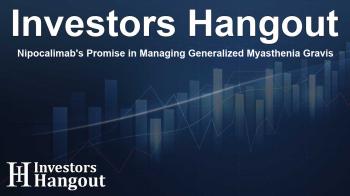Nipocalimab's Promise in Managing Generalized Myasthenia Gravis

Overview of Nipocalimab in Generalized Myasthenia Gravis
Nipocalimab has emerged as a groundbreaking FcRn blocker, marking a significant advancement in the treatment of generalized myasthenia gravis (gMG). This investigational therapy stands out for demonstrating sustained disease management over a 24-week period in adult patients with antibody positive classifications, such as anti-AChR, anti-MuSK, and anti-LRP4. Recent findings published in The Lancet Neurology indicate a remarkable reduction in autoantibody levels, one of the core issues underlying gMG, by as much as 75%.
Significant Study Outcomes
The comprehensive clinical study, known as Vivacity-MG3, incorporated a diverse population of adult patients, confirming that nipocalimab effectively addressed key symptoms of gMG. Participants in the study experienced significant improvements in their MG-ADL scores. Specifically, the study's primary goal — the mean change in the Myasthenia Gravis – Activities of Daily Living (MG-ADL) score from baseline — demonstrated statistically meaningful results, showcasing nipocalimab's potential to enhance quality of life.
Safety and Efficacy Profile
Through analysis, nipocalimab exhibited a safety profile that mirrored that of placebo, with adverse event rates low enough (5.1% for nipocalimab versus 7.1% for placebo) to ensure patient safety. Experts in the field, including Dr. Carlo Antozzi, stress the significance of these findings, which further foster confidence in nipocalimab's ability to empower patients battling gMG.
Mechanisms of Action
Nipocalimab functions by specifically binding to FcRn, effectively lowering levels of immunoglobulin G (IgG) antibodies while maintaining the immune system's protective capabilities. Findings showed a 75% reduction in total IgG levels, confirming its targeted mechanism against autoantibody diseases. This reduction not only helps with the management of gMG but also suggests that the patient’s immune defense system retains its integrity during treatment.
The Need for Innovative Treatments
The ongoing search for advanced therapeutic options for gMG has accentuated the importance of sildenafil as a treatment alternative. Experts like Dr. Sindhu Ramchandren from Johnson & Johnson reaffirm the explicit need for effective immunoselective therapies that can potentially deliver sustained disease control to patients with gMG. Given that gMG is a lifelong autoantibody-driven disease affecting nearly 700,000 individuals globally, nipocalimab appears uniquely positioned to fill this gap.
Regulatory Developments
The excitement around nipocalimab escalated when it was granted Priority Review status by the U.S. FDA in light of the promising Vivacity-MG3 study results. Both a Biologics License Application for the FDA and a Marketing Authorisation Application for the European Medicines Agency have been submitted to expedite the availability of nipocalimab for clinical use.
Future Prospects
With additional designations, including U.S. FDA Breakthrough Therapy Designation for different immunological conditions and a strong commitment to research from Johnson & Johnson, nipocalimab is paving the way for potentially transformative treatment protocols in gMG. The long-term impacts of this treatment could be life-changing for many patients, offering hope where few options currently exist.
Frequently Asked Questions
What is generalized myasthenia gravis (gMG)?
gMG is an autoimmune disorder where the immune system produces antibodies that block or disrupt communication between nerves and muscles, leading to muscle weakness and fatigue.
What role does nipocalimab play in treating gMG?
Nipocalimab is an investigational therapy that reduces levels of pathogenic antibodies in patients with gMG, showing promise for enhancing symptoms and quality of life.
How effective is nipocalimab according to recent studies?
Recent studies indicate that nipocalimab can significantly reduce autoantibody levels by up to 75% and improve important clinical metrics like the MG-ADL score.
What are the safety concerns associated with nipocalimab?
The investigational therapy has demonstrated a safety profile comparable to placebo, suggesting it can be well tolerated by patients with gMG.
What regulatory approvals has nipocalimab received?
Nipocalimab has received Priority Review designation from the U.S. FDA, with applications submitted for further approvals in Europe, highlighting its potential as a novel treatment for gMG.
About Investors Hangout
Investors Hangout is a leading online stock forum for financial discussion and learning, offering a wide range of free tools and resources. It draws in traders of all levels, who exchange market knowledge, investigate trading tactics, and keep an eye on industry developments in real time. Featuring financial articles, stock message boards, quotes, charts, company profiles, and live news updates. Through cooperative learning and a wealth of informational resources, it helps users from novices creating their first portfolios to experts honing their techniques. Join Investors Hangout today: https://investorshangout.com/
Disclaimer: The content of this article is solely for general informational purposes only; it does not represent legal, financial, or investment advice. Investors Hangout does not offer financial advice; the author is not a licensed financial advisor. Consult a qualified advisor before making any financial or investment decisions based on this article. The author's interpretation of publicly available data presented here; as a result, they should not be taken as advice to purchase, sell, or hold any securities mentioned or any other investments. If any of the material offered here is inaccurate, please contact us for corrections.
